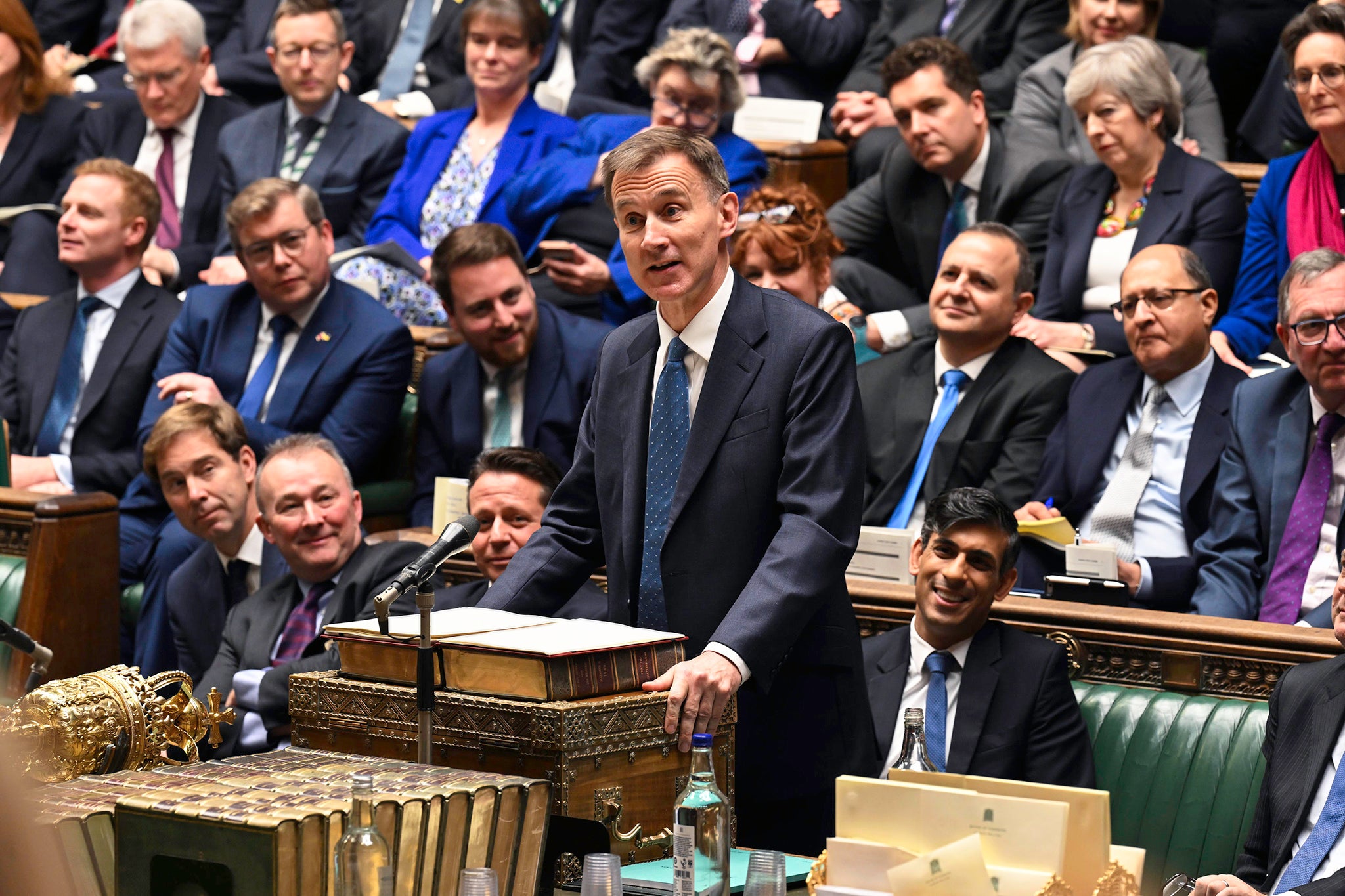Tax cut? You must be joking – it’s a tax rise (but most of it will happen under Labour)
Pre-election Budgets are great occasions for double-speak, but Jeremy Hunt has outdone himself this time, writes John Rentoul


Now is not the time to cut taxes, so we should congratulate Jeremy Hunt on not cutting them. Indeed, taxes need to go up to pay for better public services, so we should praise the chancellor for increasing the tax burden over the next few years.
But we should also admire his cheek in claiming to be cutting taxes at the same time. Pre-election Budgets are great occasions for double-speak, but Hunt has outdone himself this time. Having said since Kwasi Kwarteng’s disastrous tax cuts a year ago that we couldn’t have tax cuts because they are inflationary, Hunt has announced tax cuts even though they are inflationary, claiming that it is all right because inflation is coming down (even if it would come down faster without an inflationary tax cut).
Rishi Sunak and Hunt know their history. They know that income tax cuts before elections helped Margaret Thatcher establish the Conservative reputation as the party that is more careful with taxpayers’ money. They also know their more recent history, which is that Ken Clarke, when he was chancellor in 1996, cut a penny off the basic rate of income tax and boasted of creating a “Rolls-Royce economy”. Just as they did today, Tory backbenchers cheered and shouted “More”.
The parallel is uncanny. Then, the Tories had been in power for too long, and a former chancellor turned prime minister hoped that a return to the old formula would help the Tories to a fifth consecutive election victory. All for nothing. The people had already decided that it was time for a change, and the Tories were swept out of office by a landslide.
It is hard to believe that Sunak and Hunt will be much more successful in their last-gasp tax cut than Major and Clarke were. But you can see what the plan is, and it may help save a few seats and limit the damage. The plan is that people will feel better off after the big cut in national insurance contributions in January, even though most of them are still worse off than they were before the pandemic. Then Sunak and Hunt hope to repeat the trick at the Budget in March, with another tax cut in April, funded by any kind of tricksy accounting that they can get past the Office for Budget Responsibility.
They hope that this will create a temporary effect enough to bend the graphs that show that next year will see a big dip in living standards. They hope to confuse people with enough smoke and mirrors that they cannot give a straight answer to the killer question asked by Rachel Reeves, the shadow chancellor: are you better off than at the last election?
It is the best that Sunak and Hunt can do, but it is unlikely to make much difference to a nation that has decided that the Tories have had long enough and too little to show for it. Even so, it will make some difference – not least because it puts Reeves and Keir Starmer in a more difficult position.
Labour will obviously have to accept the cut in national insurance contributions – they can’t promise to reverse it – but that takes another chunk of money out of the Treasury coffers for the years to come. The tax cut is an illusion, in that the overall tax burden is forecast to rise for the next five years, but it obviously will rise by slightly less than if Hunt hadn’t made the tax cut.
Which means squeezing the budgets of the incoming Labour government even more tightly. Those finances were already incredibly tight – and I mean “incredibly” literally, because, as the Institute for Fiscal Studies repeatedly points out, the public spending assumptions for after the election are unbelievable.
Reeves didn’t mention that in her response to the autumn statement. Nor did she point out that the chancellor will only meet his rule that debt must be falling as a share of national income in five years’ time if he puts up petrol duty, as the Office for Budget Responsibility said again in its report today. Because she has the same rule; so she can’t meet it either, without raising taxes or cutting spending. And she has also an extra £28bn a year borrowing for green investment to find by the end of a five-year parliament.
This spells trouble for Labour – not just after the election, when its honeymoon is likely to turn sour in record time, but in the six months to a year before it, when the party will struggle even more to say how it will pay for anything.
We had a taste of it in Prime Minister’s Questions just before the autumn statement. Starmer raised the problem of teenage suicides and mental health, and said: “If we were to scrap tax loopholes, we could have thousands more staff, more support in our schools, more support in our communities.”
Scrapping those “tax loopholes” is going to look more and more like “tax rises under Labour” as the election approaches. Personally, I think that is no bad thing. For all the panic about the highest taxes in peacetime history, the tax burden in Britain is still lower than in most other European countries, and if we want decent public services we should be prepared to pay for them.
But that is very much not Labour’s message. Labour’s message of “no plans for higher taxes” is almost as incredible as Hunt’s “tax cuts while taxes are going up”. I see trouble ahead.






Join our commenting forum
Join thought-provoking conversations, follow other Independent readers and see their replies
Comments